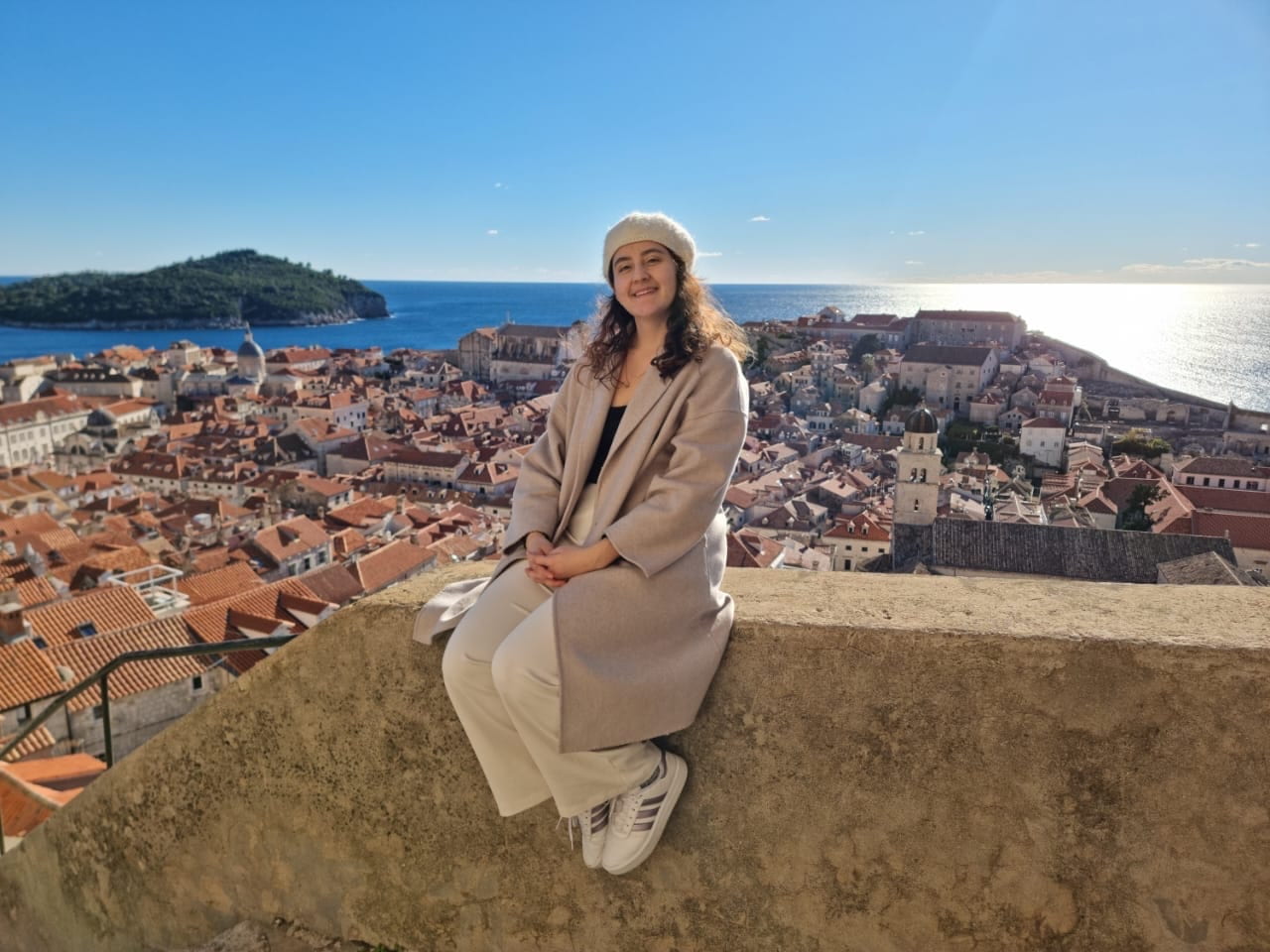
About the Author
María Camila Lancheros Vega is a visiting research scholar at the Schepens Eye Research Institute of the Massachusetss Eye and Ear Infirmary, Harvard Medical School associate. Originally from Bogotá, Colombia Camila has two commitments in life, the first is to advance the medical field in the quest to find therapies for people who suffer from sight-robbing diseases. The second is to retribute to her homeland the opportunities she had when she was growing up. E-mail: mlancherosvega@meei.harvard.edu
Acerca del Autor
María Camila Lancheros Vega es investigadora visitante en el Schepens Eye Research Institute del Massachusetts Eye and Ear Infirmary, asociado a la Escuela de Medicina de Harvard. Oriunda de Bogotá, Colombia Camila tiene dos compromisos en su vida, el primero es desarrollar el campo de la medicina en la búsqueda de terapias para personas que sufren de enfermedades que deterioran la visión. El segundo es retribuirle a su país las oportunidades que le fueron concedidas desde que era niña.
Es Vicepresidente de Retribución a la Comunidad de la Asociación de Estudiantes Colombianos en Harvard.
E-mail: mlancherosvega@meei.harvard.edu
Colombian Women Who Empower Dreams
Photos by María Camila Lancheros Vega

Left to right: Mateo Useche, Vicepresident, Harvard Colombian Student Association (HCSS); Ana Sánchez, executive director, “De mis manos”; Isabella de los Rios, Vicepresident of Retribution to the Community, HCSS; Juliana Cabrejo CEO & Co-Founder LatinoAmerica Business Center; Diana Grass. President HCSS, Nadia Sánchez, Founder and President, Fundación She Is; Juliana García-Mejía Ph.D. in Astrophysics, Harvard; Juliana González Community Manager HCSS, Camila Lancheros Vicepresident of Retribution to the Community, HCSS; Leidys Gutiérrez, Academic Vicepresident, HCSS; Iván García, President of COLSA undergraduate association; Juliana Jiménez, Vicepresident Social HCSS; Mábel Lara, Afro-Colombian journalist.
The verraquera of Colombian women knows no bounds. This was the message left with me by the March 30 symposium, “Empowering Dreams: 1st symposium in honor to Colombian women at Harvard.” This event that marked a before and after in my life, and I dare to say, in the lives of many others. Born and raised in Colombia with a mother from Santander, a region of the country known for having strong-willed brava women, I had instilled in me a strong determination and taught me the importance of asserting my opinion. However, I also grew up perceiving the deep inequalities that darken the future of many girls in my country, overshadowed, deprived of education and dreams. This reality taught me that being born into privilege is not an excuse for indifference, but an urgent call to fight for a future where all girls can aspire to and achieve their dreams without barriers.
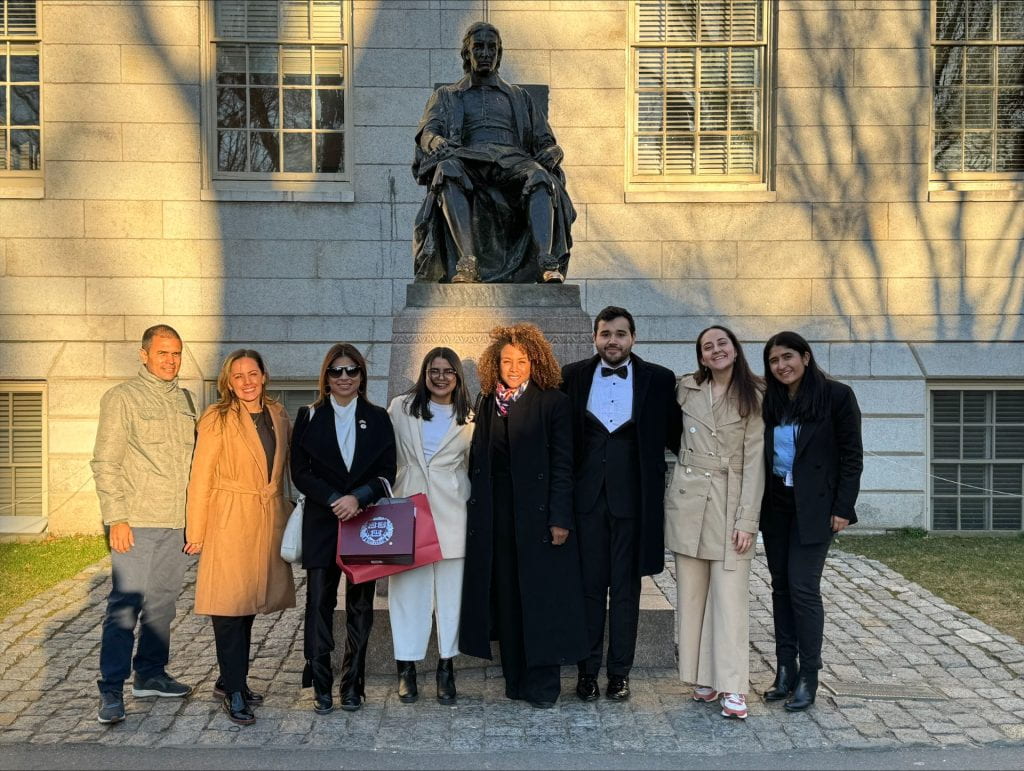
Since last year, when I joined the Colombian Student Association at Harvard (HCSS), I elected to transform this space into a tool for giving back to the community. Thus, inspired by Colombian leaders advancing projects with a gender focus, we as an association thought that the social work of women in Colombia deserves to be highlighted, and we had the tools to make this possible. With the support of the Harvard College Women’s Center and COLSA, “Empowering Dreams” was born, a space in the heart of Harvard that seeks to amplify the voices of our Colombian leaders, illuminating a path towards gender equality and recognition.
Undoubtedly, “Empowering Dreams” has left an indelible mark on Harvard and on all of us who had the honor of being part of this event. As a Colombian, as a woman, I believe that this symposium became a tapestry of life lessons. Juliana García showed us the magic of pursuing our curiosities to the ends of the universe. Juliana Cabrejo reminded us that overcoming fear and persisting opens windows of unforeseen opportunities. Mábel Lara taught us the transformative strength of staying true to our purposes. Ana Sánchez, Nadia Sánchez, Leonor Zalabata, Patricia Sierra, María Luisa Zapata, Natalia Espitia and Yolanda Perea, each in their own way, illuminated us with their testimonies of courage, leadership and the tireless pursuit of equity.
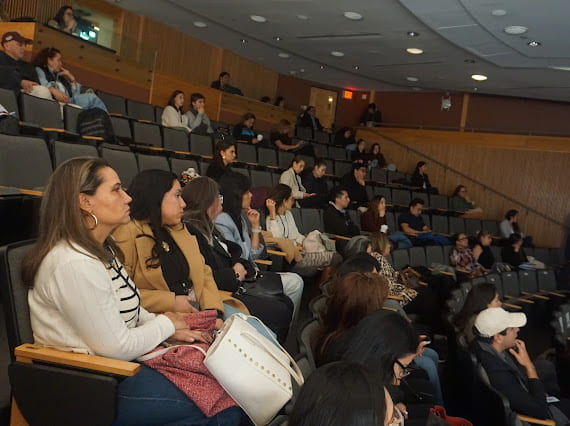
“Empowering Dreams: The first symposium in honor of Colombian women” not only raised the banner of Colombian women at Harvard but also became a beacon of hope and a reminder that our duty is to live in service to others. It was a testament to the limitless power of Colombian women and an open invitation to all to build a future where every girl and woman can walk with their head held high, secure in their place in the world, and proud of their unbreakable strength.
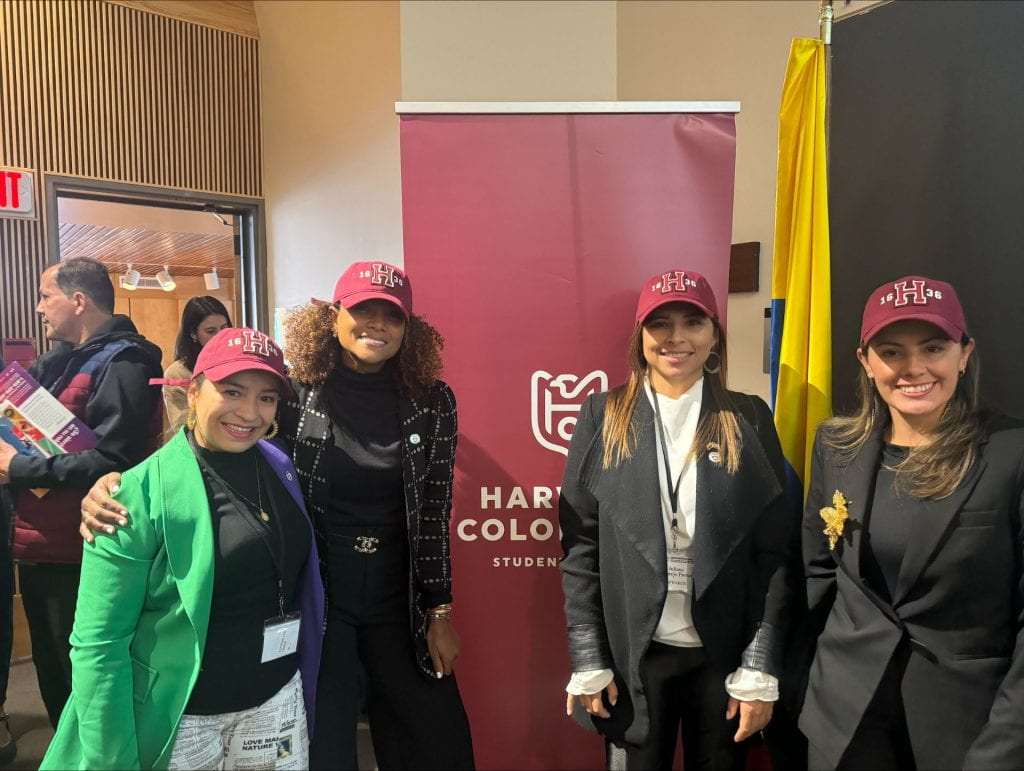
*Verraquera (Colombia, informal): synonym of strength, courage, and entrepreneurship.
*Brava: person with a strong will.
Mujeres colombianas que empoderan sueños
Por María Camila Lancheros Vega

Izquierda a derecha: Mateo Useche Vicepresidente de HCSS, Ana Sánchez Directora Ejecutiva “De mis manos”, Isabella de los Rios Vicepresidente de Retribución a la comunidad HCSS, Juliana Cabrejo CEO & Co-Founder LatinoAmerica Business Center, Diana Grass Presidente HCSS, Nadia Sánchez Fundadora y Presidente Fundación She Is, Juliana García-Mejía PhD en Astrofisica, Harvard, Juliana González Community Manager HCSS, Camila Lancheros Vicepresidente de Retribución a la comunidad HCSS, Leidys Gutiérrez Vicepresidente Académica HCSS, Iván García Presidente de COLSA, Juliana Jiménez Vicepresidente Social HCSS, Mábel Lara periodista Afrocolombiana.
La verraquera de la mujer colombiana no tiene límites. Este fue el mensaje que me dejó el simposio “Empoderando Sueños: 1er simposio en honor a la mujer colombiana en Harvard”. El pasado 30 de marzo tuve el privilegio de ser parte de este evento que marcó un antes y un después en mi vida y, me atrevo a decir, en la vida de muchos otros. Nacer y crecer en Colombia con una mamá santandereana -región del país conocida por tener mujeres “bravas*”—me inculcó una determinación férrea y me enseñó la importancia de hacer valer mi opinión. Sin embargo, también crecí percibiendo las profundas brechas de desigualdad que ensombrecen el futuro de muchas niñas en mi país, relegadas a un segundo plano, privadas de educación y sueños. Esta realidad me enseñó que nacer en el privilegio no es una excusa para la indiferencia, sino un llamado urgente a luchar por un futuro donde todas las niñas puedan aspirar y alcanzar sus sueños sin barreras.

Desde el año pasado, cuando me uní a la Asociación de Estudiantes Colombianos en Harvard (HCSS)- decidí hacer de este espacio una herramienta para retribuir a la comunidad. Fue así, como tras ser inspirada por líderes colombianas que adelantan proyectos con enfoque de género, pensamos como Asociación que la labor social de las mujeres en Colombia merece ser resaltada y nosotros teníamos las herramientas para hacer esto posible. Fue así como con el apoyo del Harvard College Women’s Center y COLSA, nació “Empoderando Sueños”, un espacio en el corazón de Harvard que busca amplificar las voces de nuestras líderes colombianas, iluminando un camino hacia la igualdad de género y el reconocimiento.
Sin lugar a dudas, “Empoderando Sueños” ha dejado una marca indeleble en Harvard y en todos los que tuvimos el honor de ser parte de este evento. Como colombiana, como mujer, este simposio se convirtió en un tapiz de lecciones de vida. Juliana García nos demostró la magia de perseguir nuestras curiosidades hasta los confines del universo. Juliana Cabrejo nos recordó que superar el miedo y persistir abre ventanas de oportunidades insospechadas. Mábel Lara nos enseñó la fuerza transformadora de mantenernos fieles a nuestros propósitos. Ana Sánchez, Nadia Sánchez, Leonor Zalabata, Patricia Sierra, María Luisa Zapata, Natalia Espitia y Yolanda Perea, cada una a su manera, nos iluminaron con sus testimonios de coraje, liderazgo y la incansable búsqueda de equidad.
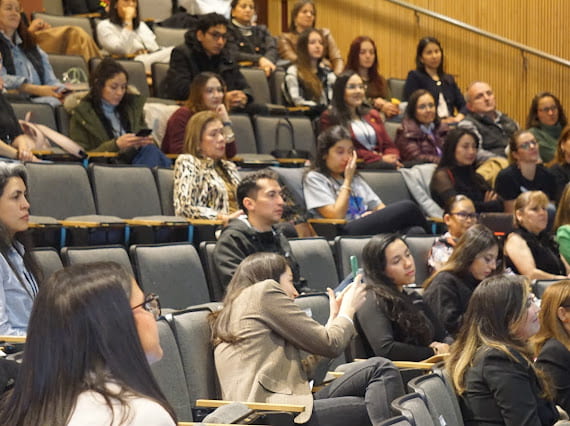
“Empoderando Sueños: El primer simposio en honor a la mujer colombiana”, no solo elevó el estandarte de la mujer colombiana en Harvard, sino que también se convirtió en un faro de esperanza y un recordatorio de que nuestro deber es vivir al servicio de los demás. Fue un testimonio del poder ilimitado de la mujer colombiana y una invitación abierta a todos a construir un futuro donde cada niña y mujer pueda caminar con la cabeza alta, segura de su lugar en el mundo y orgullosa de su inquebrantable verraquera.

*Verraquera (Colombia, informal): sinonimo de pujanza, valentia y emprendimiento.
*Brava: persona con carácter fuerte.
More Student Views
Beyond Presence: Building Kichwa Community at Harvard
I recently had the pleasure of reuniting with Américo Mendoza-Mori, current assistant professor at St Olaf’s College, at my current institution and alma mater, the University of Wisconsin-Madison. Professor Mendoza-Mori, who was invited to Madison by the university’s Latin American, Caribbean, and Iberian Studies Program, shared how Indigenous languages and knowledges can reshape the ways universities teach, research and engage with communities, both local and abroad.
Of Salamanders and Spirits
I probably could’ve chosen a better day to visit the CIIDIR-IPN for the first time. It was the last week of September and the city had come to a full stop. Citizens barricaded the streets with tarps and plastic chairs, and protest banners covered the walls of the Edificio de Gobierno del Estado de Oaxaca, all demanding fair wages for the state’s educators. It was my first (but certainly not my last) encounter with the fierce political activism that Oaxaca is known for.
Public Universities in Peru
Visits to two public universities in Peru over the last two summers helped deepen my understanding of the system and explore some ideas for my own research. The first summer, I began visiting the National University of San Marcos (UNMSM) to learn about historical admissions processes and search for lists of applicants and admitted students. I wanted to identify those students and follow their educational, professional and political trajectories at one of the country’s most important universities. In the summer of 2025, I once again visited UNMSM in Lima and traveled to Cusco to visit the National University of San Antonio Abad del Cusco (UNSAAC). This time, I conducted interviews with professors and student representatives to learn about their experiences and perspectives on higher-education policies such as faculty salary reforms and the processes for the hiring and promotion of professors.




